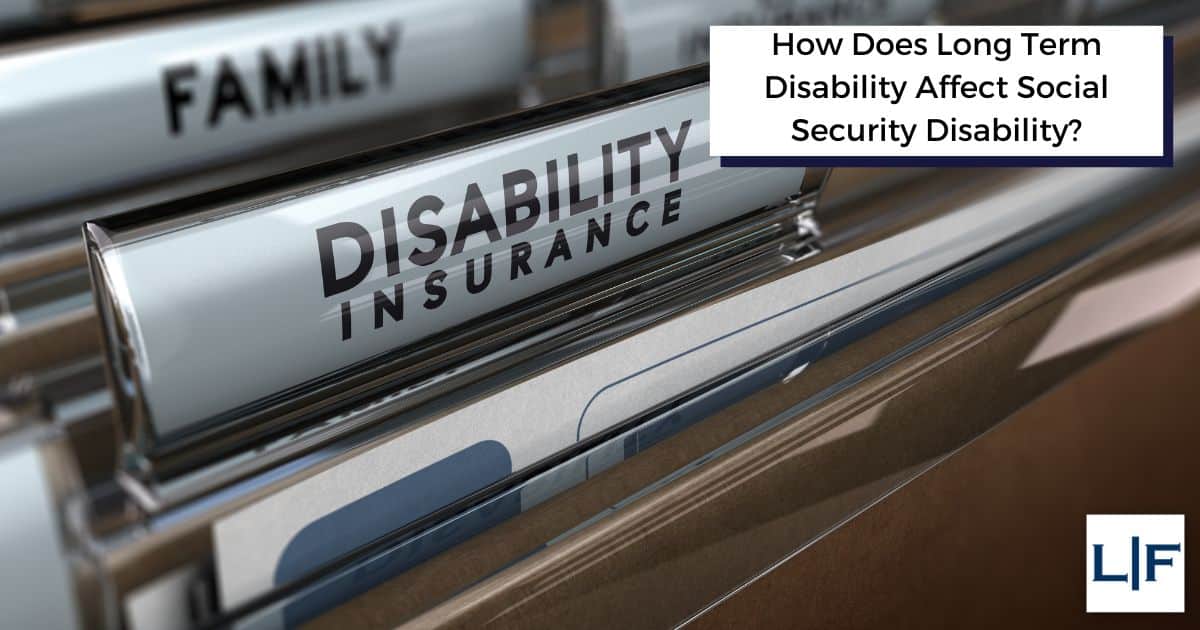Long-term disability affects Social Security disability in quite a few ways. Receiving long-term disability (LTD) benefits can make you ineligible for Social Security Disability Insurance (SSDI) or Supplemental Security Income (SSI) benefits, or lower the amount you receive, depending on the facts of the individual case.
What are LTD benefits?
LTD benefits are different from Social Security disability benefits in that they are available through your employer or a private company. They still provide much-needed benefits for disabled parties struggling to make ends meet, but the administration of and process to obtain these benefits is different.
Social Security disability programs are available through the Social Security Administration (SSA), not your employer or private company.
Will receiving LTD benefits make me ineligible for SSDI?
No. Your eligibility for SSDI relies on whether you are engaging in substantial gainful activity (SGA). The SSA considers SGA work “that involves doing significant physical or mental activities.” Because recovering LTD benefits does not require physical or mental effort, it is not considered to be SGA.
Can I get both LTD and SSDI benefits?
Yes. In fact, many LTD private insurance policies require you to apply for SSDI benefits.
Be sure to read through your policy to determine whether you need to apply.
Will receiving SSDI benefits affect my LTD benefits?
For most people the answer is yes. The SSDI benefit amount you receive may offset your LTD benefits. For example, if you receive $2,000 from LTD and $1,000 from SSDI, your LTD insurer will reduce your payments to $1,000 to offset the benefits you receive from SSDI.
LTD may also take a portion of your back benefits for the time it covered your disability without help from SSDI benefits. For example, if it took 16 months from the time your condition first became disabling to receive benefits, your LTD insurer may take the 11 months of back benefits you received to cover “overpayment” of benefits. (You only receive 11 months because there is a five-month waiting period on benefits.)
You need to read your LTD policy to determine if this offset or backpay provisions apply to your situation. If you have questions, contact the person at your company who handles the LTD claims.
If I am approved for SSDI benefits, will that automatically qualify me for LTD benefits?
No. Each LTD benefits program has its own criteria to qualify for benefits, which could be completely different than the SSDI requirements. And you likely will not receive approval at the same time. In fact, in most cases, you will receive approval for LTD benefits long before you qualify for SSDI benefits.
Will qualifying for LTD benefits automatically qualify me for SSDI benefits?
No. The SSA uses the Listing of Impairments, also called the Blue Book, to determine who qualifies medically for SSDI benefits. That is only the first step of the SSDI qualification process. After a person qualifies medically, he must also prove that, because of his medical condition, he is unable to work any kind of job. Third, he must show he worked long enough at a job that paid into the Social Security system to be eligible for SSDI benefits.
In order to qualify for LTD benefits, one must prove whatever the particular LTD program requires. For example, Allison receives LTD benefits from an LTD program paid for by her employer. To qualify for LTD benefits, she had to meet the requirements contained in the policy. In her situation, she had to show that, due to a disability, she was unable to do the job she had previously done for her employer.
This is very different from the eligibility requirements for SSDI. In order to be considered disabled for purposes of SSDI, Alison would have to not only be unable to do her previous job, due to a disability, but she would also have to be unable to do any kind of work.
Will receiving LTD benefits make me ineligible for SSI?
It depends on the amount you receive in LTD benefits. Because SSI is for people with low income and very few assets, both earned income and unearned income count for purposes of qualifying for SSI.
For example, Bill receives $5,000 a month in LTD benefits. Because the SSA considers his LTD disability policy unearned income, it does not disqualify him for SSDI benefits. It does, however, make him ineligible for SSI, because SSI counts both earned income and unearned income.
To be eligible for SSI benefits, his monthly LTD benefit would need to be below the year’s limit.
Will I automatically be eligible for SSI benefits if I am receiving LTD benefits?
No. LTD has its own eligibility rules. To be eligible for LTD, you must meet those rules. To be eligible for SSI, you must meet the SSA’s eligibility qualifications.
Get help from Lunn & Forro, PLLC.
At Lunn & Forro, PLLC, we are dedicated to helping people receive the SSDI and SSI benefits they need to take care of themselves and their families. We do not handle LTD claims, but we are happy to help you determine how an LTD benefit could affect your SSDI and SSI benefit. We can also refer you to an attorney to help you with your LTD claim. Call us today at 888-966-6566 to schedule your consultation with a Raleigh Social Security disability lawyer.
Related Posts

When am I Considered Disabled by Social Security?
Social Security considers you to be disabled when you have a serious medical condition that prevents you from working. To determine whether a person is

What Is SSI?
Supplemental Security Income (SSI) is a safety net for certain individuals with low income and little assets. SSI provides money so these people can meet

What Is SSDI – Social Security Disability Insurance?
SSDI, which is also called Social Security Disability Insurance, is a government program that gives disabled American workers a monthly income. When you suffer from

Can You Receive Inheritance While on Social Security Disability?
Yes. Inheritance can affect Social Security disability benefits. Much depends on the type of benefit you receive. Below, we discuss the implications of inheritances in
Can I Qualify for Both SSI and SSDI Disability Benefits?
Yes. In some cases, you may be able to qualify for both Supplemental Security Income (SSI) and Social Security Disability Insurance (SSDI) benefits. The Social
What are the Disability Listings for a Social Security Claim?
The disability listings can make it easier for you to qualify for Social Security disability benefits. If you are considering filing an application for Social
How Do I File a Disability Appeal?
You gave Social Security Disability all the information they asked for and agreed to a medical exam, but your disability claim was still denied. It
What If I Miss My Social Security Appeal Deadline?
What is the Social Security Disability Appeal Deadline? The most common Social Security Disability appeal deadline is 60 days. If your initial claim is denied,



